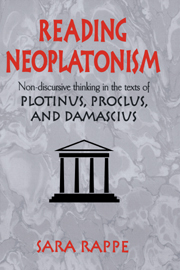Book contents
- Frontmatter
- Contents
- Preface: Discursive Strategies and Neoplatonic Texts
- Acknowledgments
- List of Abbreviations
- 1 Introduction. Representing a Tradition: Exegesis, Symbol, and Self-reflection
- PART I LANGUAGE IN THE ENNEADS
- PART TWO TEXT AND TRADITION IN NEOPLATONISM
- 6 History of an Enigma: Mathematical Symbolism in the Neoplatonic Tradition
- 7 Transmigrations of a Myth: Orphic Texts and Platonic Contexts
- 8 Language and Theurgy in Proclus' Platonic Theology
- 9 Damascius' Ineffable Discourse
- 10 Conclusion: Reading Neoplatonism
- References
- General Index
- Index Locorum
8 - Language and Theurgy in Proclus' Platonic Theology
Published online by Cambridge University Press: 24 October 2009
- Frontmatter
- Contents
- Preface: Discursive Strategies and Neoplatonic Texts
- Acknowledgments
- List of Abbreviations
- 1 Introduction. Representing a Tradition: Exegesis, Symbol, and Self-reflection
- PART I LANGUAGE IN THE ENNEADS
- PART TWO TEXT AND TRADITION IN NEOPLATONISM
- 6 History of an Enigma: Mathematical Symbolism in the Neoplatonic Tradition
- 7 Transmigrations of a Myth: Orphic Texts and Platonic Contexts
- 8 Language and Theurgy in Proclus' Platonic Theology
- 9 Damascius' Ineffable Discourse
- 10 Conclusion: Reading Neoplatonism
- References
- General Index
- Index Locorum
Summary
Introduction: Exegetical Methods in the Platonic Theology
Proclus' Platonic Theology is an exegetical text that bears the unmistakable imprint of the Late Athenian school. Not only does it present the works of Plato in constant dialogue with competing theological systems to which the Neoplatonists accorded scriptural status, such as the Chaldean Oracles and Rhapsodic theology, but the Platonic Theology offers itself as a theurgic text in its own right. For Proclus, Plato's discourse on the nature of the divine constitutes a mystagogy, an initiation into theurgy.
Proclus sets out the plan of his work in chapter 2 of the Platonic Theology. There he outlines the book according to three central divisions: Plato's teachings concerning the nature of the gods, the structure of the divine hierarchy, and a miscellany of Platonic gods, hypercosmic and encosmic, that appear less systematically in the writings of Plato. Thus the Platonic Theology treats Plato's dialogues according to a scheme in which various aspects or attributes of deity are dispersed triadically within the Laws, Republic, Phaedrus, and Phaedo. The second part of the work describes, as Proclus promises, the central constituents of the divine world, although some of the plan is missing from the work as we have it. Beginning with the One (bk. II), the Platonic Theology continues down the grades of reality, to the Henads, the intelligible gods, the intelligible-intellective gods, the intellective gods, and the hypercosmic gods. This level is as far as our text reaches.
- Type
- Chapter
- Information
- Reading NeoplatonismNon-discursive Thinking in the Texts of Plotinus, Proclus, and Damascius, pp. 167 - 196Publisher: Cambridge University PressPrint publication year: 2000



